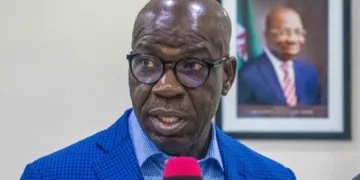President Bola Tinubu has said his administration will need the support of the National Assembly to fully implement some of the reforms he introduced.
Tinubu expressed confidence that when the time comes, the governing partnership that has been established between the executive and the legislature will ensure that these changes are swiftly effected to benefit the nation.
The president stated this while declaring open a two-day retreat for members of the House of Representatives on Economic Transformation and Development in Abuja yesterday.
Represented by his chief of staff, Hon Femi Gbajabiamila, Tinubu said his administration is implementing significant policy changes to reform how to govern and position the country for progress and shared prosperity for all citizens.
“These reforms, while necessary and, in some cases, long overdue, are not without their challenges. I am deeply grateful for your unwavering support and understanding during these times. Your understanding and support have been invaluable, and I am confident that with our continued collaboration, we can overcome any challenges that lie ahead.
“The oil and gas industry has long been the lifeblood of our national economy. My administration is working tirelessly to change this and diversify our economy from overreliance on the production of fossil fuels. However, we are also determined to maximise revenue potential from this critical industry.
For this reason, we are pushing policies to attract investment in the oil and gas sector,” he said.
Tinubu said he signed an executive order to unlock about $10 billion in fresh investments in the oil and gas sector through Fiscal Incentives for Non-Associated Gas (NAG), Midstream and Deepwater Oil and Gas Developments.
“Just last week, the Federal Government of Nigeria signed the Consolidated Guidelines for implementing Fiscal Incentives for the Oil & Gas Sector. The guidelines, which represent a cornerstone of the Presidential Directive, aim to enhance the Nigerian oil and gas sector’s global competitiveness while stimulating economic growth.
“The Executive Order also streamlines contracting processes, procedures, and timelines from 36 months to 6 months. The order also seeks to ensure that local content requirements are implemented without impeding investments or the cost competitiveness of oil and gas projects.
“Related to this are the reforms we are implementing to our tax regimes to limit the taxes collected without negatively affecting government revenues. All of these have the same objective – to reduce government interference with the commercial imperatives of businesses in the country so that businesses based here can be competitive and focus on their core objectives of economic growth through innovation and trade.
“We will need the support of the National Assembly to fully implement some of these reforms, as statutory changes will be required in some areas. I am confident that when the time comes, the governing partnership we have established between the Executive and the Legislature will ensure that these changes are made swiftly to benefit our nation.
“The very essence of checks and balances means there will be times when the executive and legislative prerogatives inevitably collide. Above all else, the national interest must guide our decisions in those moments,” he added.
In his remarks, speaker of the House, Hon. Abbas Tajudeen expressed the readiness of the 10th House to aid the economic policies and programmes of President Tinubu’s administration.
Abbas decried that Nigeria’s efficiency in collecting Value Added Tax (VAT) “is the lowest among its African peers, indicating significant inefficiencies in its tax system.”
He said the lack of growth in non-oil revenue sources and the volatile nature of oil income underscore the urgent need for Nigeria to diversify its revenue base and enhance its fiscal management to ensure economic stability and growth.
Abbas noted that the House made a deliberate decision to focus on tax reforms and modernisation as well as a review of the implementation of the Petroleum Industry Reform Act (2021).





